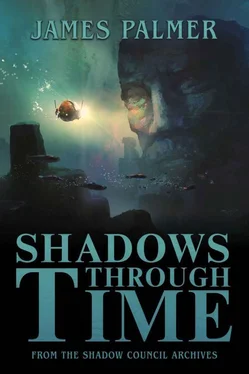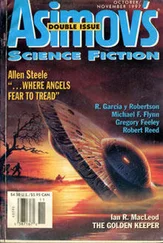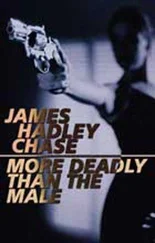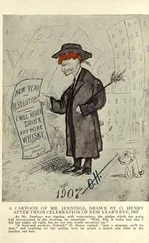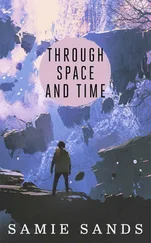Burton turned from his books to the wall of weapons. Gleaming swords, spears and firearms and other mementos from his travels greeted him. Burton glanced at one rather lethal-looking spear, touching his left cheek, where a similar weapon had left a triangular scar.
A knock on the study door startled Burton from his reminiscences. “Come in.”
His landlady and house keeper Miss Angell appeared, carrying a silver tray laden with food. “I thought I heard you up and milling about. Figured you’d want breakfast up here.”
“That would be fine, thank you.”
Miss Angell moved to Burton’s writing desk, which was almost devoid of papers and knick-knacks, and set the tray down and poured him a cup of coffee.
“There you go,” she said. “Eat up. You almost withered away on that trip of yours.”
Burton smiled. Since his return, it had been Miss Angell’s main goal in life to return him to some level of fat respectability. When she left the room, Burton sat down and did just that, tucking into his eggs and sausage with relish. He drank his coffee and stared at his massive bookshelf, starting to feel like his old self once more. He could almost forget the strange events of last evening had happened at all.
Almost.
Burton finished his breakfast and puttered around in his study, a loss as to what to do. He wrote letters and stared at one of his manuscripts without doing anything productive with it. Around noon, he had a visitor.
“Isabel,” he said before she had entered the room.
Isabel Arundell. The one thing that had kept him sane throughout his long journey had been thinking of her. She was always there, even when he was in the grips of malarial fever. He never wrote to her the entire time he was gone, save for a few lines of poetry he composed upon leaving the jungle at last and arriving at Zanzibar:
To Isabel
That brow which rose before my sight,
As on the palmer’s holy shrine;
Those eyes—my life was in their light;
Those lips—my sacramental wine;
That voice whose flow was wont to seem
The music of an exile’s dream.
Burton went to her and kissed her cheek, squeezing her hands in his. She smiled up at him. “I thought I’d surprise you,” she said. “How have you been? I heard about that business with Speke.”
“I am doing much better now that I’ve seen you.” He turned from her sight and looked out the window, as if seeking something far away.
“What is it, Richard?”
He met her gaze once more. “It’s—I’ve been restless since I returned. I think it’s the old explorer in me, wanting to set out on another adventure.”
“You will, my love,” said Isabel. “When we get to Trieste. You can write and finish your translations. We will be adventurers together.”
Burton opened his mouth, closed it. The diplomatic post destined to be the most boring thing the explorer had ever set out to do. He’d told himself that was what he needed for the back half of his life, solace and solitude with which to write. No malaria, no restless, spear-waving natives to menace him.
“I know that look,” Isabel said. Her mouth, a perpetual smile, began to quiver.
Burton took a step back. “What look?”
“The wanderlust in your eyes.” She took a step back, fidgeting with the bodice of her dark dress. “I thought you’d come back to me ready to settle down and start our lives together.”
“It’s nothing like that,” said Burton. “It’s just that…something has come up. An exciting invitation too enticing to turn down. I thought I could, at first, but now…” He let his voice trail off. It would do him no good to say anything further.
Isabel stared at him for a full minute before her mouth creased into a smile. “I should have known better than to think an explorer could just stop exploring. You haven’t got it out of your system yet.”
“It would appear so,” said Burton.
“So where is it this time? Back to Africa? A trek across the Himalayas? Steamy Kathmandu?”
“No, nothing like that. I can’t really say. I don’t think you’d believe me if I told you. But I can promise that there will be no treacherous jungles and no malaria involved.”
“I can thank God for that,” Isabel said flatly. “All right, Richard Burton, you old pain in the rump. I’ve waited three years. I can wait a little more. You can go on your little adventure. I’ll be right here when you get back.”
She reached up to squeeze his shoulders. “But I’d better not hear you’ve been visiting brothels with that reprobate Swinburne or the rest of your Cannibal Club lot.”
Burton grinned. “I would not sully your good name in such a fashion. I can assure you the Cannibals are in no way involved.”
Isabel gave him a stern glance. “Just assure me that you will come home to me. Safe and sound.”
She kissed him on the cheek and left. Burton stood there for a long time, staring at his study door, wondering just what he had done. His adventuring was behind him, and now he was going off on another. One in which he had no idea what was going to happen. It was the most excited he had felt in a long time.
Now clear on what he had set out to do, Burton tackled his tasks with much more clarity than he had shown that morning. He dashed off a few quick letters to various members of the Cannibal Club—Swinburne, Dr. James Hunt, Richard Monkton Milnes, and Sir James Plaisted Wilde—asking them to do various things for him while he was away, such as looking in on Ms. Angell and Isabel, as well as one to Sir Roderick Murchison, president of the Royal Geographical Society, regarding his conclusions about the true source of the Nile. Once that was done, Burton set about packing for his strange journey.
The problem was that, for the first time in his life, he didn’t know what he would need. He had traveled by ship many times, but he had never voyaged beneath the waves. He settled on filling a worn leather portmanteau suitcase with a few linen shirts, khaki pants, and an extra jubba. Next Burton went to his wall of weapons, selecting a pistol and ten rounds of ammunition and an Nepalese khukuri, or Gurkha, knife. The curved, almost boomerang-shaped blade glinted brightly in the late afternoon sun that shone through his study window. He gripped the blade’s wooden handle and tested the blade’s keen edge on the fine hairs on his left arm and, finding its sharpness satisfactory, sheathed it and placed it atop his portmanteau alongside the holstered revolver.
At midnight, Burton arrived, carrying his portmanteau and armed with pistol and blade. Last night’s fog didn’t make a return appearance. Burton stepped to the edge of the wharf and looked down at the Thames, the water green where the street lamps touched it, black where it twisted out of their reach. He curled his nose from the stench.
A moment later another horse-drawn hansom clopped to a stop, and a large man alighted and paid his fare. Challenger glanced at Burton and nodded once. He too carried a large bag, but Burton couldn’t tell if the huge zoologist was armed.
“Captain Burton,” he said as he stepped to the water’s edge.
“Challenger.”
“Lovely night for an adventure.”
“I suppose,” said Burton. “If one must have them at night.”
Challenger barked laughter. “Let’s hope our strange Miss Marsh doesn’t keep us waiting, eh?”
They stood in silence a while before Challenger broke it by saying, “I thought you had your fill of exploring.”
Burton shrugged, his eyes still on the Thames. “So did I.”
Challenger chuckled. They waited some more.
At midnight—on the dot this time—they heard a familiar churning of the water and watched in amazement as a familiar shape arose from the Thames. The hatch opened, and once again Elizabeth Marsh climbed out to meet them, this time in a red dress.
Читать дальше
